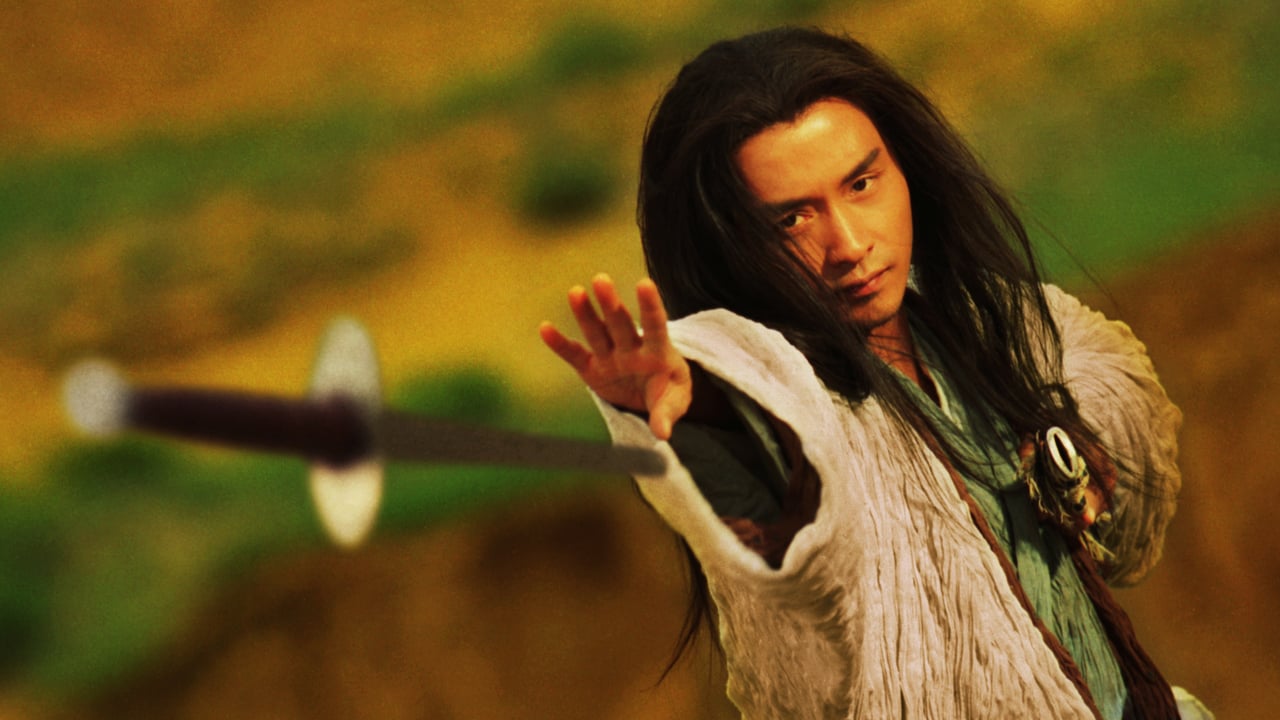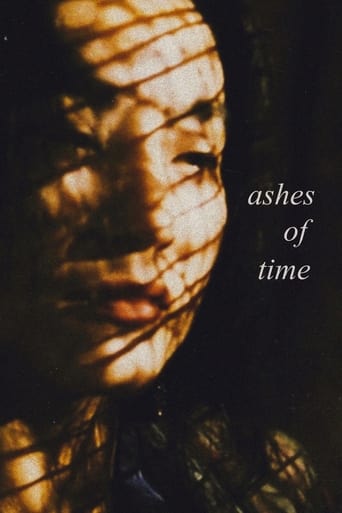

The greatest movie ever!
... View MoreI cannot think of one single thing that I would change about this film. The acting is incomparable, the directing deft, and the writing poignantly brilliant.
... View MoreThis is a coming of age storyline that you've seen in one form or another for decades. It takes a truly unique voice to make yet another one worth watching.
... View MoreStrong acting helps the film overcome an uncertain premise and create characters that hold our attention absolutely.
... View More"Ashes of Time" is a definitive movie in this particular genre that should be on the shelves of any movie collector - especially those who are interested in Asian movies.The movie, though it is labeled as a martial arts epic, is driven more by the storyline, the acting and the dialogue, than it is by the actual swordsplay and martial arts. And this was a risk on director Wong Kar Wai's part - but a risk that was well worth it in many ways. Because the end result is a heavier movie that punches harder and leaves a lasting impression.Not only is the movie driven by an appealing story that is riveting and captivating, but the movie also has a good amount of iconic Hong Kong actors and actresses on the cast list; Leslie Cheung (playing Ou-yang Feng), Tony Leung Chiu Wai (playing the blind swordsman), Bridgette Lin (playing Mu-rong Yin/Mu-rong Yang), Tony Leung Ka Fai (playing Huang Yao-shi) and of course Maggie Cheung (playing the woman). It is indeed a grand ensemble of acting talents put together in one movie. And especially the performance of Leslie Cheung - whose death was a hard blow to Hong Kong cinema - really put on a marvelous performance in "Ashes of Time".The dialogue is good and fluently, keeping the movie well up in pace. And the dialogue is a great core of the movie, so it is an important aspect of the movie, an aspect that just has to work out. And it did!"Ashes of Time" is also a visually spectacular movie, filmed on location in the harsh deserts of western China, near Mongolia. And the scenery tells a thousand tales in this movie, and it is in itself a major center piece for the movie.If you haven't seen "Ashes of Time" by now, I can only encourage you to get to it, because this is a very important and defining movie in Hong Kong cinema. This movie is breathtakingly exceptional in many ways.
... View MoreI am a Wong Kar Wai fan for years, and it took me a long time to finally get my hands on this movie. It's a beautiful and poetical movie. Yet, I didn't like it as much as the other Wong Kar Wai movies I have seen. Actors and characters are amazing, so is also the atmosphere and music. (Even though the music was not perfectly fitting in a few scenes.) The music often uses cheap synthesizer keyboard sounds. I personally like it, I can imagine though, that others dislike it.The thing that put me off the most have been the cuts. So many cuts have been plain bad. I don't actually get how this can happen to such a great director. The action scenes sucked almost every time. Often there have been several cuts in one second. But even in non-action scenes, stuff sometimes was cut too suddenly, and one scene didn't seem to fit to the other.Another problem for me has been the story. To me it seemed, that Wong had great and amazing ideas. Ideas that could have made a perfect movie. But he couldn't pull it off completely. This movie is full of great approaches, but somehow lacks the final "cut". The characters motivations couldn't convince me, and I found the episodic stories not perfectly connected to each others. Usually Wongs movies impress and move me totally. This time I have been quite entertained, but rarely impressed and moved. Some other movies of his I'd rate with 10 points. This one is not able to go above the 8 point mark.
... View MoreThere are movies that, by dint of their measured mood alone, can draw the viewer in and hold the attention. VAMPYR comes to mind, as does RASHOMON; SEVEN SAMURAI; STRAY DOG; HIGH AND LOW; THE WINDOW; REAR WINDOW; CLOSELY WATCHED TRAINS; ERASERHEAD; THE BLACK STALLION; TROUBLE IN MIND; others. Add to that select list ASHES OF TIME. Like CROUCHING TIGER, HIDDEN DRAGON after it, ASHES OF TIME comes across as a profound meditation on Love Lost, of opportunity missed. The performances are all of the highest caliber- as is the direction. The cinematography by Christopher Doyle is jaw-droppingly beautiful. The music wrings the heart. (And, lest one forget: the fight choreography by Sammo Hung is absolutely spectacular.) I read somewhere, once, that it's not the Love we've lost that's important: what's important is the fact that we Love at all. I think that's about right. It sure feels right.
... View MoreYour ability to enjoy The Ashes of Time may depend on our expectations before stepping into the theater. Even its most strident supporters seem to agree that audiences can be split right up the middle in their appreciation of this unique film.Unlike most HK actioners, the battle scenes are curiously kept at a distance. When they do happen, they're rendered in a jerky style in which it's difficult to make out exactly what's occurring on screen. The dramatic scenes can be extravagantly beautiful, with the of Maggie Cheung, Brigitte Lin, and a roll-call of HK's top acting talent chewing up the scenery. As with some of Wong Kar-wai's early work, the dialog could be more precise. In short, The Ashes of Time requires a forgiving attitude. Released around the same time as Wong Kar-wai's spectacularly successful Chungking Express, it's clear that the director isn't as confident working with the elements of the martial arts film. Anyone looking for tense action is likely to be disappointed. But those intrigued by the director's aesthetic will likely find this a unique experience at the very least.
... View More